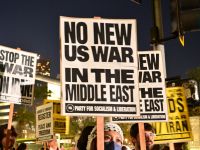What on earth, I asked Zaki Nusseibeh, one of the advisers to the government's cultural affairs ministry, was Prince Mohammed banging on about? "The Arab peoples in their revolutions asked for dignity," he replied. "They asked for a future. But… you need to create the 'custom' for discussion and for accepting other people's point of view. All that is happening with religious ideology in this part of the world is a fascist movement. Teaching is by rote – I mean this, by rote – and people are not encouraged to have critical thinking. They don't listen to music at a young age or know what it's like to go to a museum. Sheikh Zayed said this as early as 1968."
Mr Nusseibeh sits on a Rhodes Scholarship committee and says how rewarding it is to see two young UAE students competing with international students, to see them go to Oxford to get their Masters. So Abu Dhabi and the other emirates must have good universities, he says, fine schools, a commitment to "education and culture". Investing in the future, every Abu Dhabi government official will tell you, is also about renewable energy, solar energy, but it's primarily about education.
"Political ideology has taken over from education," Mr Nusseibeh says of recent Arab history. He talks of the museums and the Biennale in Sharjah and Abu Dhabi and then blurts out one of those clichés which always make me suspicious: that Abu Dhabi must be "a role model for the societies around us – look at the media, the internet city, the communications infrastructure…"
It's not long ago that the West told the Arabs that Turkey should be their role model – until Recep Tayyip Erdogan started going bonkers, talking about plots and locking up journalists and turning into a role model for the Mubaraks and Ghaddafis that had already passed into history. Yet it's not difficult to see what Abu Dhabi is trying to do. If Saudi Arabia is the empire of prayer and Qatar the empire of television – and Egypt the empire of far too many people – then Abu Dhabi runs the empire of higher education, the one commodity which has always failed the Arabs, or which the Arabs have always failed to take advantage of.
And if Isis is a cult of lost souls, which it is, then what Abu Dhabi says it believes in is the antithesis of the "Islamic State", and its crown prince's plans to form a new non-violent front line against Isis. It's tempting, indeed, to wonder if "the Arab world", that singularly inappropriate phrase which we Westerners invented along with "the Middle East", any longer has meaning. Perhaps we should re-imagine this region in three parts: the Maghreb and Egypt, the Levant and the Arab peninsula.
Of course, we would have to snap off Yemen, lest we suggest that the Arab Gulf states can all crash into the same valley of death as that country has. But in this narrative, education, the life-saver, surely, of our imagined Arab world, streams from those wealthy jewels along the Arabian gulf. Qatar too, and Kuwait, despite its corruption.
From education comes dignity and from dignity comes justice. But this is surely too sentimental. It's glorious to know that in Abu Dhabi there is an Abu Dhabi Choral Group, an Abu Dhabi Music and Arts Foundation, an Amadeus Music Institute, a House of Oud, studying the Arabic stringed instrument which is a distant relative of the lute, the International Music Institute and the Modern Art Music Institute. But then I find Abu Dhabi's version of Time Out lists 108 bars and nightclubs in its entertainment inventory. Is it trying to imitate Dubai? Can there be two Dubais – or two Abu Dhabis – in the Emirates?
And who are they ultimately for? Not for the four million foreign labourers, of course. Nor for the middle-class elites who arrive from the West and from the rest of that amorphous "Arab world". An Iraqi high-up in the medical profession in Abu Dhabi – which is why he, too, asked to remain anonymous – explained his relationship with the Emirate in surprisingly frank terms. "We all came here by choice," he said over the hottest coffee I've ever tasted in Arabia. "I made an informed decision – I believed I would have a better life here. I'm very happy with the way they run their country."
He paused here, I think because – as a doctor as well as an expatriate – he didn't want to give Abu Dhabi too clean a bill of health. "The deal is this: 'We're going to pay you money and you can have the lifestyle you have chosen – but you have no rights.' A non-Emirati cannot go to a government school. You can only go to a government hospital in emergency. I'm here as a servant of the country. I know if I don't want to be a servant any more, I can get on a plane and go home."
Then he thought for a moment and captured the venality of it all. "We're all here by invitation – or temptation."
By Robert Fisk








